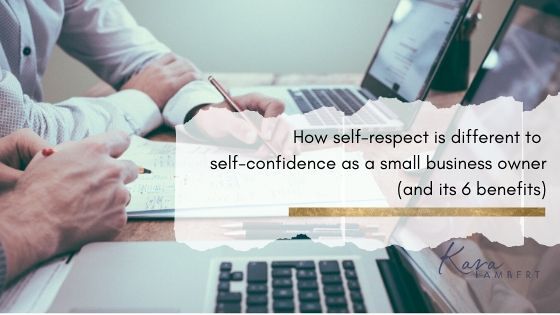When I surveyed my coaching clients about what they needed as small business owners, they answered ‘self-respect’. When I googled it, self-confidence came up in the results & I thought, “Close Mr Google but they’re different”.
So how is self-respect different to self-confidence as a small business owner & why does it matter?
Let’s start off with the boring part of some definitions, remembering that I’ve gone back to my psychology text and so they can be a little dry.
Self-respect definition
Self-respect is liking who you are as a person, physically, emotionally, socially, psychologically, spiritually. It’s also showing grace and kindness to yourself in your thoughts, actions, beliefs, & values. Self-respect does not rely on how well you do something.
Self-esteem definition
Self-esteem is the belief in your abilities and actions as a person. Your belief in your ability relies on you comparing it to either your expectations or someone else.
TIP: Self-respect impacts on our self-esteem. If our belief about ourselves as a person is low, we are starting at a lower point to compare our abilities as a person.
Look, I could mic drop right here and call it a day but let me get back to some of the ways psychology has shown self-respect impacts on us.
Why does self-respect matter in small business?
So let’s check out how a lack of self-respect can show up when you’re a small business owner.
The bad side of self-respect
I t’s not quite like having a photo taken from a bad angle, but a lack of self-respect can not just be unflattering, it can actually be quite dangerous.
t’s not quite like having a photo taken from a bad angle, but a lack of self-respect can not just be unflattering, it can actually be quite dangerous.
I already mentioned how low self-respect can impact your self-esteem. When business owners have low self-esteem they can be filled with doubt and will often not promote themselves or their business because they don’t believe in their abilities.
You keep bad habits, health, hygiene, boundaries.
These are probably the most commonly known ways we deny ourselves self-respect, though some of you might be surprised that boundaries is on the list.
If you do not look after yourself physically, something I am learning to do, then you are likely to struggle with performing at your best. You might feel tired. You might not pitch or follow up on people because of your physical appearance.
TIP: It’s accepted that ‘first impressions count’ and some customers will question how well you will care for their custom if you aren’t so great at caring for yourself.
I want to go into boundaries a little more as we go through some of the ways a lack of self-respect impacts small business.
You look to others for validation.
Don’t mistake this for imposter syndrome, that’s a whole other thing. This is a lack of trust in you and you turn to others to provide it. This is stereotypically, “Do I look good in this”, “Am I over reacting”, “Do you think I’m crazy”.
While we can look to others for validating what we do, that’s an issue with self-esteem and self-confidence that I discussed previously, this is looking to others to reassure you that you’re a good person.
If you are asking staff to validate you then you are not behaving as a leader. It is hard for a person to trust, rely upon, or respect you if you show them that you can’t do it yourself.
Similarly, if you do similar with a business partner, they too will question you as a person. They might even start second guessing if the partnership is the right thing, especially if it starts creeping in to your dealings with clients.
You make excuses for others, constantly.
When people let you down, do you make excuses for them? (not to be confused with excusing them) This is a clear sign that you do not respect your own boundaries and you are putting the needs of others above your own.
A common one I see with small business owners is making excuses to clients for staff. No! Please don’t.
TIP: Clients don’t care why something didn’t happen as expected they just want what they were told to expect.
If you are constantly making excuses for staff, then you need to talk with them about setting realistic expectations with clients. If they are setting realistic expectations and not delivering, then this is when you need to look into performance managing your staff.
You tolerate disrespect or abuse from others, emotional, psychological, verbal, physical.
Ouch! Yes, this includes clients. Did you know you can sack clients? And you should if they are disrespectful or abusive to you, your premises, or your staff.
TIP: You teach people how to treat you.
So if you do not respect yourself, you then teach others it’s ok to disrespect you. This could be staff, clients, or partners. You deserve to be treated with respect, just as they expect it from you.
Being constantly disrespected and abused impacts the stories we tell ourselves about ourself. It is these stories our brain uses to fill gaps when

You agree with others to avoid conflict.
Are you a people-pleaser? Hate disappointing people? These are all variations on the theme.
Agreeing with people to avoid conflict is a clear lack of boundaries and respect for them and yourself.
Agreeing to avoid conflict, again teaches people how to treat you. It is problematic when it comes to managing staff or disgruntled customers.
The good side of self-respect
When you accept and respect yourself, deeply, for you who are and not just what you do, some incredible things happen.
You will be clear on what is and isn’t acceptable, of yourself and how others treat you.
You become very clear on your boundaries.
You become very clear on what you’re doing and where you’re going.
You become clear on who truly have your back and are important to you.
You are less susceptible to blame, guilt, regret, lies, secrets, or stress.
When you accept and respect yourself, warts and all, it changes how others perceive you.
Even if you weren’t a small business owner, wouldn’t you want this for yourself? Let me know in a comment below.
Reference
Langer, E. 1999., “Self-Esteem vs. Self-Respect”. Psychology Today https://www.psychologytoday.com/au/articles/199911/self-esteem-vs-self-respect

